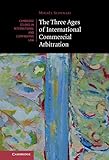The Three Ages of International Commercial Arbitration / Mikaël Schinazi, Institut d'Études Politiques de Paris (Sciences Po).
Series: Cambridge studies in international and comparative lawPublisher: Cambridge, United Kingdom ; New York, NY : Cambridge University Press, 2022Description: pages cmContent type:- text
- unmediated
- volume
- 9781108835176
- 9781108799775
- 341.522 SCH 23
- K2400 .S35 2022
- LAW051000
| Item type | Current library | Collection | Shelving location | Call number | Status | Date due | Barcode |
|---|---|---|---|---|---|---|---|
 BOOKs
BOOKs
|
National Law School | Reference | REFERENCE SECTION | 341.522 SCH (Browse shelf(Opens below)) | Checked out | 06.05.2024 | 38575 |
Contents:
1. General introduction;
2. Introduction to the Age of Aspirations;
3. Genealogy of international commercial arbitration;
4. The arbitration clause saga in French law and the emergence of a special regime for international commercial arbitration;
5. Introduction to the Age of Institutionalization;
6. The construction of a coherent framework for international commercial arbitration;
7. The development of the ICC arbitration system;
8. Introduction to the Age of Autonomy;
9. Lex Mercatoria and the birth of the French school of international arbitration;
10. The second generation of the French school of international arbitration and the quarrel over the arbitral legal order;
11. General conclusion;
Bibliography;
Index
"There is no one way of writing the modern history of international commercial arbitration, but rather a "radical pluralism" of historical methods and approaches, several of which will be used in this book. Schematically, one could focus on the history of events, the history of concepts, or the history of individual people (there are indeed many well-known, as well as less known but no less fascinating, figures in the modern history of international arbitration). When it comes to concepts, one could trace the history of the notion of lex mercatoria or that of the arbitral legal order, for example. With regard to events, one could explore narrow timescales, focusing, for example, on a few key events and explaining how they led to the present state of international commercial arbitration. This approach - which some might call histoire événementielle or event-based history, with its "brief, rapid, nervous fluctuations" - views history as closely tied to specific events. Applied to the study of international arbitration, it would focus on a few relevatory moments that led to the current state of affairs. For example, the genesis of the New York Convention was a seminal moment and turning point in the modern history of international commercial arbitration. Participants from a wide range of national, cultural, and legal backgrounds gave detailed thought to the role that individual states should play in the modern international arbitration compact. This event had broader implications for the modern history of international commercial arbitration"-- Provided by publisher.

There are no comments on this title.